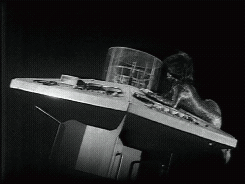Season 6, Story 2 (Overall Series Story #45) | Previous - Next | Index
Look, you guys, Wendy Padbury's backside in a sparkly catsuit is not the only reason to watch "The Mind Robber." If it's one of your motivations, well, it'll take a better man than I to pass judgment on you. Seriously though, beyond ...
 |
| Image via Flight Through Eternity |
Focus.
Let's start with the elements of this story that have resonances through the future history of the series. In some cases, it's probably just accidental but, taken all together, in a narrative that is dancing with the distinctions between fiction and reality, we're left with the feeling a lot of future Who creators were influenced by what they saw here.
- The name of the villain, the Master, is going to get reused quite a bit in the years following this story.
- The Master is a penny dreadful writer, who claims to have written the adventures of Captain Jack Harkaway ... a name which we don't have to exert ourselves very hard to link to Captain Jack Harkness. I say claims because, IRL, the Jack Harkaway stories by Bracebridge Hemyng are out there to be had from Project Gutenberg and probably other sources if you're willing to dig around for them.
- The Doctor and Zoe encounter a Minotaur, long before we meet one in "The God Complex."
- The TARDIS flies apart (or does it?), a state of affairs we'll see again in "Frontios."
- That's there's a master computer brain behind the whole set up is nothing new, see "The War Machines," and we'll see it again in "Face of Evil." The difference here is the Master Brain is in charge of a fictional world, not the 'real world'. (Although, there is a plan to take over the 'real' Earth revealed at the end.)
- Writers being reality-shaping creative forces, as the Master is here, calls to mind the power of Shakespeare's words in "The Shakespeare Code"
- Jamie being replaced by another actor (due to chicken pox) but we've seen plenty of that with different actors playing the Doctor, and even different actors playing the same Doctor (Richard Hurndall), not to mention Romana, Borusa, and the Master (the other Master).
- The battle of wits between the Master and the Doctor here looks a fair bit like the battle between Four and Morbius.
- In Series 8, we've got the Doctor visiting Sherwood - maybe? Remains to be seen ...
The peril for the Doctor and the companions here is that they could be come fictional inside their universe (or, outside it, technically, in the Land of Fiction). Jamie and Zoe do get trapped in a book and become fictional, although embodied fictional, for a while. The Doctor, in battling the Master, could write himself into the story of the Land, but if he did he'd be rendering himself fictional. It defies us to acknowledge the reality that he is, in fact, fiction. That we accept this fictional character's refusal to become fictional, I think, tells us something fascinating about what the characters we love mean to us, out here, in the real world. The real world being the world we experience via our senses, in our minds -- our minds which perceive and care about fictional things and real things, and are shaped by both.
Sandifer is brilliant on the "The Mind Robber," so it makes sense to quote him at length.
And that's the genius of The Mind Robber. It comes at one of the series' darkest moments - when its formula seems tired, its very ethics seem to be flagging, and when the entire cultural and ideological foundation for it appears to be crumbling the world over. And right in that moment, we get explicit confirmation of something that previously we had only hoped for and suspected. That Doctor Who is an idea that cannot be brought to an end. That there is always another story. Not just because of the flexibility of the premise or because the series has gone on long enough that it's a cultural institution that is always going to be revisited as long as we have well enough recorded history to remember that it ever existed. No. Because the Doctor is every single story there ever was and ever could be, escaped out into the universe, and running loose bringing them into being.
This is, quite frankly, as powerful an idea as has ever been thought of in fiction. An idea that is far larger than fits in any one person's imagination, even if that imagination is bigger on the inside. Something that, quite apart from anyone's efforts to define it and create it, has taken on a life of its own. A symbol that has real power. A thought that has begun thinking for itself. A dream that no longer needs anyone but itself to dream it.
Stray Thoughts:
Is it as unusual as I think it is to hear the Doctor's internal voice, as we do when he's trying to keep his head straight after Zoe and Jamie have left the TARDIS and gone out into the white void?
The Karkus is an unfortunate name for a superhero, especially one wearing the kind of suit he's wearing, which makes him look a bit like an anatomical dummy used for studying the muscle groups.
Zoe flipping the Karkus around in a lopsided fight may not be Yuen Woo-Ping level action, but it's better than we might have expected.
 |
| Image via PeterRabid |